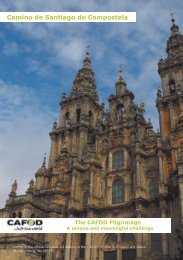Confirmation - Roman Catholic Diocese of Portsmouth
Confirmation - Roman Catholic Diocese of Portsmouth
Confirmation - Roman Catholic Diocese of Portsmouth
Create successful ePaper yourself
Turn your PDF publications into a flip-book with our unique Google optimized e-Paper software.
APPENDIX (for all three sacraments)<br />
1. Disability issues<br />
Disability should not be perceived as an obstacle to the<br />
journey in faith which we all travel and which is nourished<br />
and deepened by catechesis. Disability is not a barrier to<br />
receiving the sacraments. As members <strong>of</strong> the Church,<br />
people with disabilities are entitled to receive – and indeed,<br />
where suitably qualified, give – catechesis within the<br />
Christian community. People with disabilities who do not<br />
yet belong to the Church are also among those whom the<br />
Church seeks to call to faith. (GDC 189 and CCL 777).<br />
Every Christian community<br />
considers those who<br />
suffer...forms <strong>of</strong> disability... as<br />
persons particularly beloved <strong>of</strong><br />
the Lord. A growth in social and<br />
ecclesial consciousness, together<br />
with undeniable progress in<br />
specialized pedagogy, makes it<br />
possible for the family and other<br />
formative centres to provide<br />
adequate catechesis for these<br />
people who, as baptized, have<br />
this right and, if not baptized,<br />
because they are called to<br />
salvation. (GDC 189)<br />
Special needs<br />
Candidates with learning difficulties may need special<br />
provision in the case <strong>of</strong> such things as the renewal <strong>of</strong><br />
baptismal promises — e.g. using the dialogue form. A<br />
useful resource is Valuing Difference: People with Disabilities<br />
in the Life and Mission <strong>of</strong> the Church (Bishops’ Conference <strong>of</strong><br />
England and Wales, 1998).<br />
Often, parents do not disclose their child’s disability (e.g.<br />
dyslexia), assuming that it’s common knowledge!<br />
“The spiritual life <strong>of</strong> people with<br />
learning difficulties is nourished<br />
in a special way by their<br />
receiving Holy Communion within<br />
the loving, praying family <strong>of</strong> the<br />
Church. The Church needs to<br />
welcome this union, for ‘how can<br />
she contribute to the integration<br />
<strong>of</strong> the handicapped into modern<br />
society, if she does not<br />
endeavour to have them<br />
recognised as full members <strong>of</strong><br />
her own?’ (Pope Paul VI, Pastoral<br />
Care <strong>of</strong> Handicapped and<br />
Maladjusted Youth, October<br />
1973).”<br />
Wherever possible, people with disabilities should be included in the ordinary catechetical and<br />
social activities <strong>of</strong> each parish. For those with physical or sensory disabilities, this will require<br />
attention to how they can have access and participate as fully as possible. The inclusion <strong>of</strong><br />
people with disabilities in those activities underlines the vocation <strong>of</strong> us all to belong to the body<br />
<strong>of</strong> Christ, each <strong>of</strong> us bringing our individual gifts and insights into the mystery <strong>of</strong> Christ to be<br />
shared with other members <strong>of</strong> that body. It also usually adds to the quality <strong>of</strong> the catechesis for<br />
other people, because catechists have to plan carefully and use a wider range <strong>of</strong> methods,<br />
images and resources.<br />
One <strong>of</strong> the possible ways in which special attention and care can be given to children and<br />
young people with learning difficulties is the MEET Process.<br />
11
















